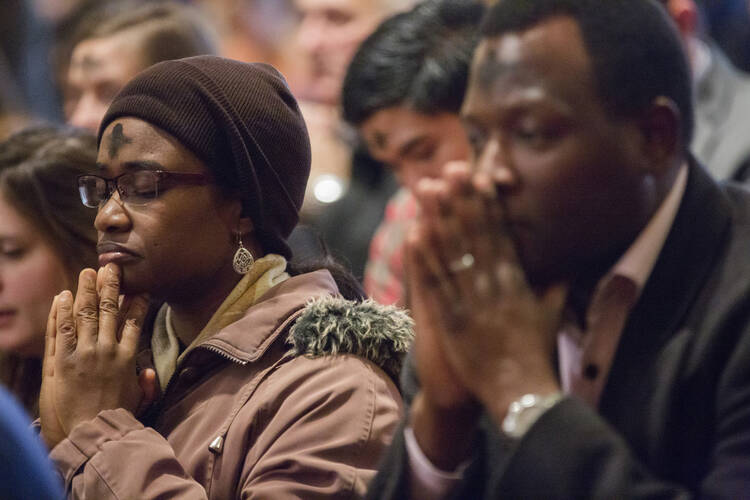Right and Just
The Ash Wednesday readings contain odd contradictions. Joel commands his listeners to blow a trumpet; Jesus tells his disciples not to “blow a trumpet before you, as the hypocrites do in the synagogues and in the streets.” Jesus commands that when his disciples fast, they should not “look gloomy, like the hypocrites…When you fast, anoint your head and wash your face.” Minutes after hearing this, Catholics process to the front of the church to put ashes on their face.
God does not see as humans see; he looks into the heart. (1 Sam 16:7)
What motivates the public actions you take on behalf of your faith?
Are any of these actions a mask that obscures other motivations?
How can your Lenten practices strengthen your desire to follow Christ?
One key idea resolves these contradictions. Judeo-Christian culture is performative. Living this tradition is not just a matter of right belief, but also of right action. Ever since the biblical prophets, thinkers in the Judeo-Christian tradition have stressed the need to match inward belief with outward action. Sometimes this is very difficult. It is easy to fall into the trap of performing “righteous” outward actions for corrupt inward reasons. Jesus calls such people “hypocrites,” a word that originally described an actor who played “behind a mask.” In Jesus’ mind, the right action was a mask that hid rather than revealed the interior spiritual state of the person undertaking the action.
The language of Jesus’ day lacked words like “spirituality” or “religion.” These ideas were expressed by the phrase “fear of the Lord,” which also included ideas like “love, respect, awe of the Lord.” It was important to Jesus that his followers act out of true fear of the Lord rather than a desire to gain the love, respect or awe of others. Fear of the Lord was performed through acts of “justice” that were right according to the Torah. Interior fear of the Lord was “righteousness,” a confidence in knowing and doing the right thing in any situation.
Jesus uses three acts mandated by the Torah to test his disciples’ motivations: prayer, fasting and almsgiving. Jesus’ test is extreme: imagine that when you give alms, your right hand does not know what your left is doing. Do you still want to give alms? In prayer, imagine that you are locked in your room and no one sees you. Do you still want to pray? In fasting, imagine that you present yourself as someone who is filled with joy. Do you still want to fast? These tests are similar in tone to the other extreme interpretations Jesus gives to the Torah—“If your right eye causes you to sin, tear it out and throw it away” (Mt 5:29). They are hypothetical situations that throw our motivations and actions into high relief.
God does not reward hypocrisy, and the reason is obvious. Outwardly pious but inwardly corrupt actions are undertaken out of “fear of neighbors” or “fear of society,” not “fear of the Lord.” Disciples who subject their interior motivations to Jesus’ tests will realize whether their goals are just and their motivations right. This is a challenge to every Christian who receives ashes today: Do the ashes reveal an inward desire to follow Christ, even if it costs your life? This is the work of a lifetime, but every year we can leave some of our hypocrisy behind.









